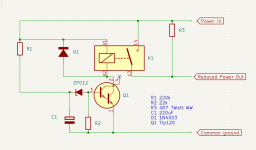Hi team, not really an audio question but I know there are plenty of brains around here… I need a very simple current limiter / softstart for an 18v DC motor, just need to slow the initial turn on hit, half a second would be fine. Motor runs at around 3-4 amps but start and full load would be a lot higher. Thought about an NTC or a two position switch with a resister that could be inline for a bit then change switch position to direct (Cut out the resistor).
What do you think?
Cheers
What do you think?
Cheers
Call me conservative. R3 seems under-rated. At 3A, it is dissipating 42W. Looked like your time constant was around 40 seconds. A ww resistor may take that, but if for any reason the relay fails to close, it will smoke.
The modern way to do that is to use an automotive electric power steering FET.
They are rated below 100v and an on resistance of a milli ohm or less.
You only need a couple of resistors and a capacitor.
The heat sink size depends on how often you stop and start.
They are rated below 100v and an on resistance of a milli ohm or less.
You only need a couple of resistors and a capacitor.
The heat sink size depends on how often you stop and start.
Except the time-constant is completely wrong. 220k * 220µF = 48 seconds. 22k & 22µF would be more appropriate for R1 and C2. This also cures the problem that R2 would only have 0.6V across it when Vin is only 18V.This should work
The time constant is of course variable and not having any requirements to hand, the schematic is intended as a starting point.
Drawing 42Watts at turn on, reduces rapidly as the motor starts to turn.
My appologies, R1 and R2 somehow got reversed. Dyslexia rules KO.
Yes a 22u or even 10u, would speed things up.
If the relay fails to close, there is no power going to the circuit. A Tip120 is unlikely to fail, hence the component of choice.
Drawing 42Watts at turn on, reduces rapidly as the motor starts to turn.
My appologies, R1 and R2 somehow got reversed. Dyslexia rules KO.
Yes a 22u or even 10u, would speed things up.
If the relay fails to close, there is no power going to the circuit. A Tip120 is unlikely to fail, hence the component of choice.
If the relay fails, all the power goes thru R3. Not sure why you think no power goes thru R3 on a relay failure. I am referring to an actual relay fail, not the circuit driving the relay.
Check out ESP Audio for a good comprehensive soft start that you can build and purchase a circuit board for.
-Tell me what role does r2 play in this circuit?
-How can I speed up the circuit recovery time after disconnection? I mean that the turn-on delay is small if it is turned on again after disconnection
-Perhaps it makes sense to install a thermistor instead of a load resistor in case the relay breaks?
-How can I speed up the circuit recovery time after disconnection? I mean that the turn-on delay is small if it is turned on again after disconnection
-Perhaps it makes sense to install a thermistor instead of a load resistor in case the relay breaks?
Thanks, can you tell me more about this circuit? Space is really limited...The modern way to do that is to use an automotive electric power steering FET.
They are rated below 100v and an on resistance of a milli ohm or less.
You only need a couple of resistors and a capacitor.
The heat sink size depends on how often you stop and start.
I was looking to use just a 3 position switch but all the rated switches seem to be center off. I really want a switch where position 1 is off, 2 is through the resistor and then 3 is resistor bypass. Simple operation, move switch to position 2 for a second then to position 3 once motor is up to speed. Trouble is I can't find the right switch...
Cheers for now.
I believe an ON-ON-ON DPDT toggle switch will do.I was looking to use just a 3 position switch but all the rated switches seem to be center off. I really want a switch where position 1 is off, 2 is through the resistor and then 3 is resistor bypass. Simple operation, move switch to position 2 for a second then to position 3 once motor is up to speed.
- Home
- Design & Build
- Electronic Design
- Soft start
